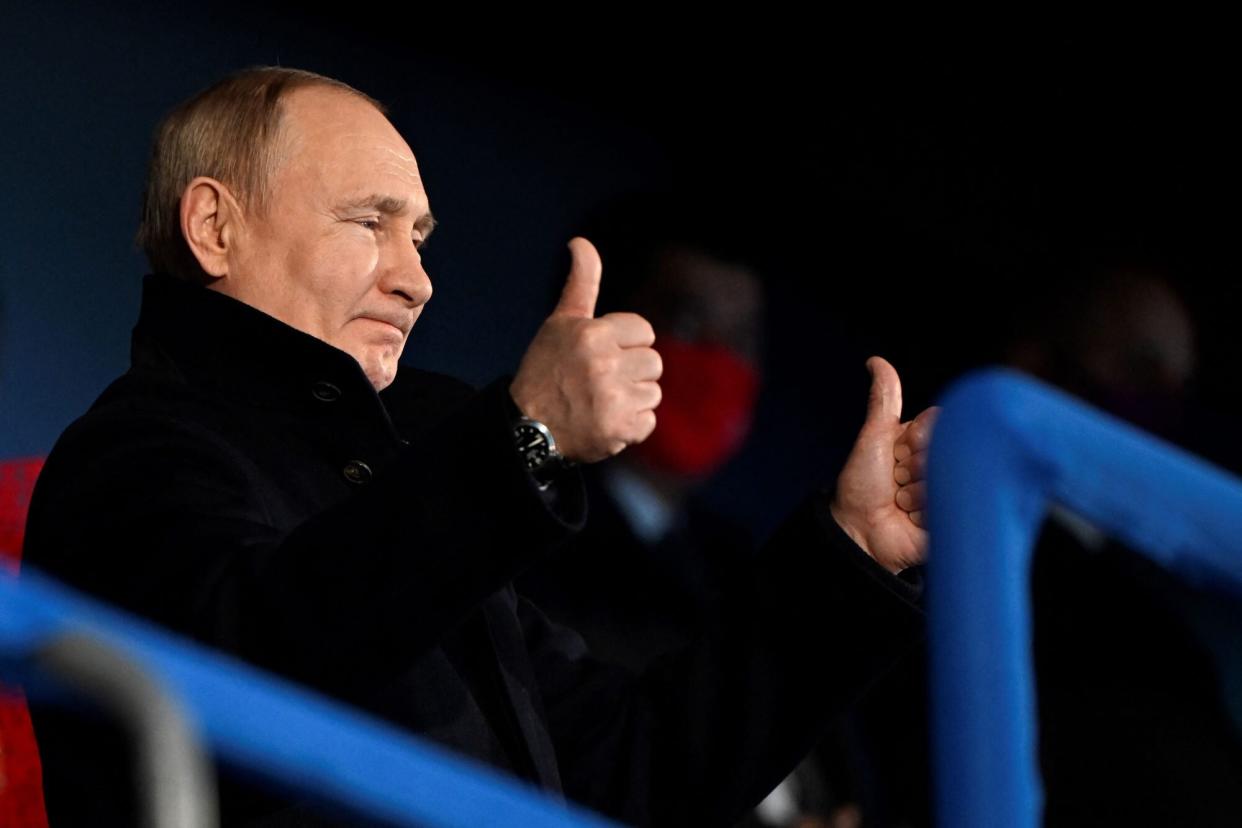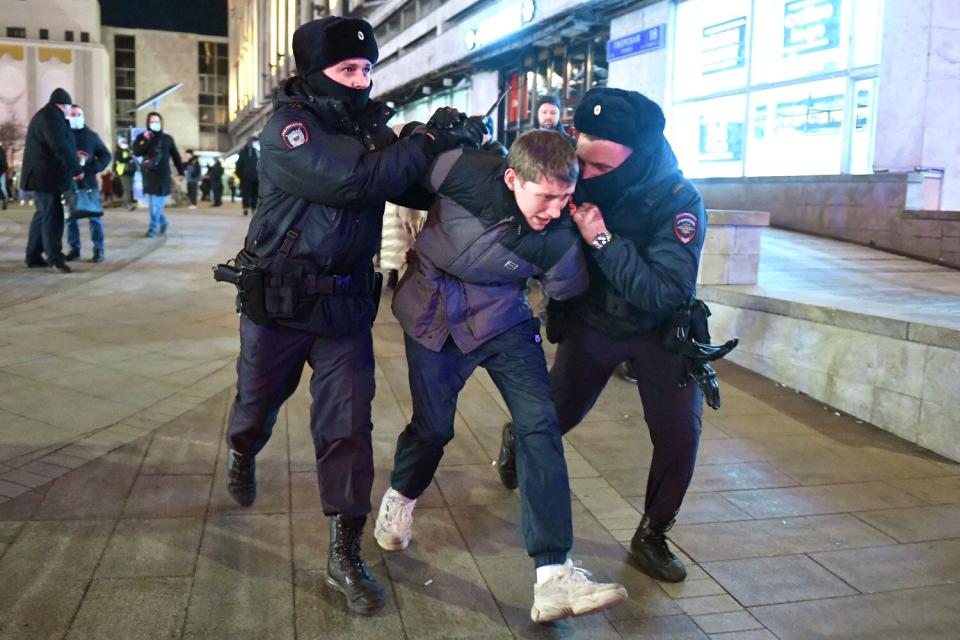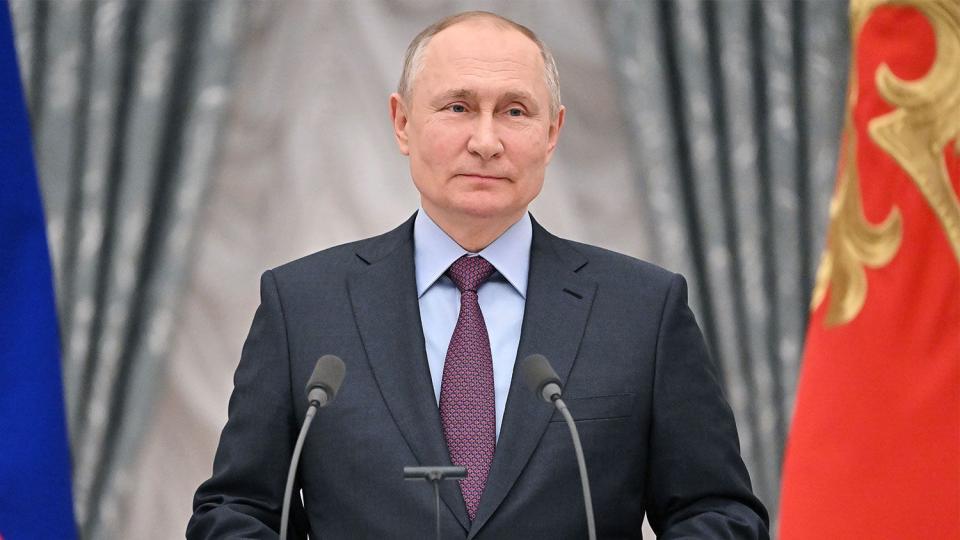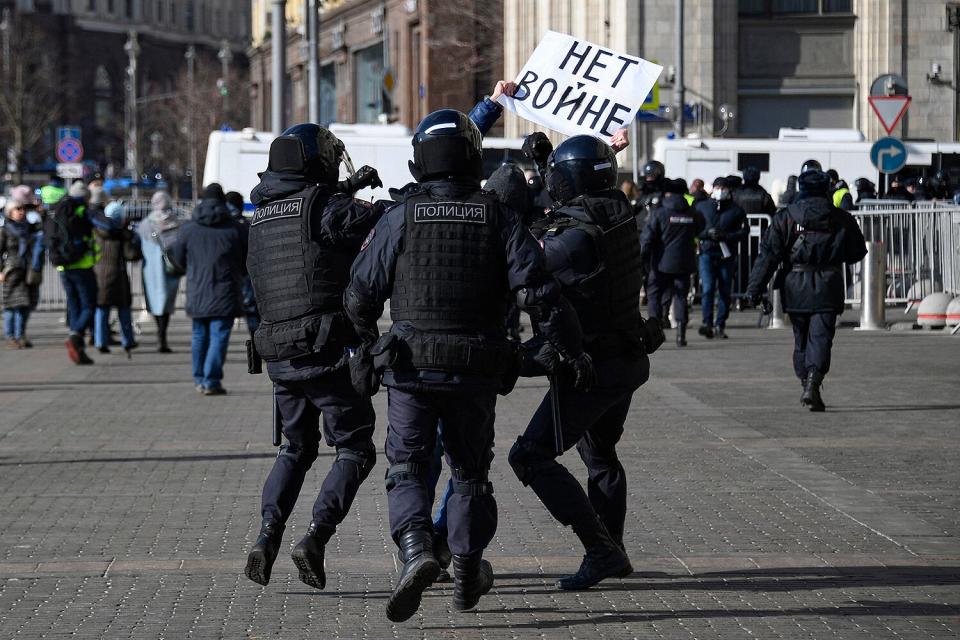Russia Further Represses War Critics as Putin Continues Invasion of Ukraine

- Oops!Something went wrong.Please try again later.
- Oops!Something went wrong.Please try again later.
- Oops!Something went wrong.Please try again later.
WANG ZHAO/AFP via Getty Images
Russian support for President Vladimir Putin and the invasion of Ukraine remains strong more than four months after combat began in late February. Now, authorities in Russia are tightening their grip, implementing new measures designed to deter or eliminate critics of the war that's killed thousands on both sides and displaced millions of Ukrainians.
Russian lawmakers have recently approved new, Kremilin-backed proposals on the definition of treason, to further restrict "foreign agents" (a term that's been applied to independent journalists) and to control information considered useful to "unfriendly countries," Bloomberg reports.
Wartime rules on public protest and censorship are also tightening, according to the news organization.
The New York Times reports that a flurry of arrests across Russia signals a new crackdown on some unlikely figures after the loudest dissenting voices have already been silenced.
RELATED: Over 1,800 Arrested After Anti-War Protests Erupt in Russia Amid Invasion of Ukraine: 'No to War'

Kommersant Photo Agency/Shutterstock
Ivan Fedotov, a goalie for Russia's national hockey team who helped win a silver medal at the Beijing Olympics this year, was arrested by men in masks and camouflage on Friday. His alleged crime, the Times reports, is evading military service. Fedotov, 25, had signed a contract with the Philadelphia Flyers and planned to relocate to the U.S.
Dmitri Kolker, a physicist who was seeking treatment for cancer at a Siberian hospital, was arrested and accused of treason. He died in custody after being transferred to a Moscow jail, according to the Times.
Another academic, economist Vladimir Mau, was placed on house arrest after being accused of fraud, according to Bloomberg, which notes his Kremlin connections as an advisor to Putin and head of a top state-run university.
Mau was one of 300 senior academic officials who signed a letter in March in support of the invasion of Ukraine, the Times reports, though that was not sufficient to keep him out of trouble.
RELATED: Life Goes On in Kyiv, Where Residents Are Resuming Normal Activities amid Ongoing Russian Threat

Sergei Guneyev/TASS/Getty Russian President Vladimir Putin
"A big enemy of the government and the stability of the government are people who carry knowledge," Leonid Gozman, an outspoken critic of Putin who worked with Mau, told the Times. "Truth is an enemy here."
Ekaterina Schulmann, a political scientist who taught at the university that Mau led, also spoke to the Times about his arrest. "Here, ambiguous loyalty may not be permitted," she said.
"The Russian people will always be able to distinguish true patriots from scum and traitors and simply spit them out like a fly that accidentally flew into their mouths," Putin said in March, the Times reported, signaling his intentions to control public opinion within Russia's borders. "I am convinced that such a natural and necessary self-purification of society will only strengthen our country, our solidarity, cohesion and readiness to respond to any challenges."
The tactics, which also include blocking social media platforms and shuttering independent as well as foreign news outlets, appear to be working.
According to Bloomberg, polls show that support for Putin has surged since the February launch of the invasion, landing above 80 percent.

AFP via Getty Police officers detain a man holding a placard reading "No to war" during a protest against Russian military action in Ukraine, in Manezhnaya Square in central Moscow on March 13
Russia's attack on Ukraine continues after their forces launched a large-scale invasion on Feb. 24 — the first major land conflict in Europe in decades.
Details of the fighting change by the day, but thousands of civilians have already been reported dead or wounded, including children, though the actual number of deaths is difficult to determine.
Nearly 9 million have fled the country as refugees — and half are children, according to the United Nations. Millions more have been displaced inside Ukraine.
The invasion, ordered by Putin, has drawn condemnation around the world and increasingly severe economic sanctions against Russia.
Never miss a story — sign up for PEOPLE's free daily newsletter to stay up-to-date on the best of what PEOPLE has to offer.
With NATO forces amassed in the region, various countries have offered aid or military support to the resistance. Ukraine's President Volodymyr Zelenskyy has called for peace talks — so far unsuccessfully — while urging his country to fight back.
Putin insists Ukraine has historic ties to Russia and he is acting in the best security interests of his country. Zelenskyy vowed not to bend.
"Nobody is going to break us, we're strong, we're Ukrainians," he told the European Union in a speech in the early days of the fighting, adding, "Life will win over death. And light will win over darkness."
The Russian attack on Ukraine is an evolving story, with information changing quickly. Follow PEOPLE's complete coverage of the war here, including stories from citizens on the ground and ways to help.

